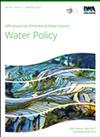廖内省水治理之谜:揭示主要参与者和互动关系
IF 1.8
4区 环境科学与生态学
Q4 WATER RESOURCES
引用次数: 0
摘要
可持续的水资源治理对于解决全球水危机和确保获得清洁水资源至关重要。就印度尼西亚而言,廖内省在为其人口提供充足的清洁水方面面临重大挑战。涉及不同参与者的合作方法已成为解决复杂水资源治理问题的潜在办法。然而,有关这些参与者在决策过程中的参与和互动的经验证据却很有限。本研究侧重于廖内省的本卡利斯地区、杜迈市和罗坎希里尔地区,采用文本网络分析(TNA)来确定当地水资源治理的主要参与者。研究结果强调了以下几点:(1) 文本网络分析确定的有影响力的参与者(节点)包括饮用水系统、财务安排、监督机制、环境问题、水的可及性和生态友好型水治理。这些行为体对与杜洛里斯水治理相关的地方政策的形成产生了微妙的影响。(2) 廖内省政府有权资助从河流到城市的管道化项目。同时,地方政府对各自地区的管道化项目承担财政责任。(3) 杜洛利斯水治理采用中央集权方式,省政府在出现问题时充当协调人,以地区间的共识作为决策工具来解决问题。本文章由计算机程序翻译,如有差异,请以英文原文为准。
Water governance puzzle in Riau Province: uncovering key actors and interactions
Sustainable water governance is crucial for addressing the global water crisis and ensuring access to clean water resources. In the Indonesian context, Riau Province faces significant challenges in providing sufficient clean water to its population. Collaborative approaches involving diverse actors have emerged as a potential solution to complex water governance problems. However, limited empirical evidence exists regarding the engagement and interactions of these actors in decision-making processes. This study focuses on Bengkalis Regency, Dumai City, and Rokan Hilir Regency, in Riau Province, using Textual Network Analysis (TNA) to identify key actors in local water governance. The findings of this study highlight the following: (1) The influential actors (nodes) identified by TNA consist of drinking water systems, financial arrangements, oversight mechanisms, environmental concerns, water accessibility, and eco-friendly water governance. These actors nuance the formation of local policies related to Durolis water governance. (2) The Riau provincial government is empowered to fund pipanization projects from the river to the cities. Meanwhile, local governments are given financial responsibility for pipanization in their respective regions. (3) Durolis water governance follows a centralized approach, with the provincial government acting as a facilitator when problems arise, where problem-solving is based on consensus between the regions as a decision-making tool.
求助全文
通过发布文献求助,成功后即可免费获取论文全文。
去求助
来源期刊

Water Policy
环境科学-水资源
CiteScore
3.10
自引率
12.50%
发文量
81
审稿时长
6-12 weeks
期刊介绍:
Water Policy will publish reviews, research papers and progress reports in, among others, the following areas: financial, diplomatic, organizational, legal, administrative and research; organized by country, region or river basin. Water Policy also publishes reviews of books and grey literature.
 求助内容:
求助内容: 应助结果提醒方式:
应助结果提醒方式:


